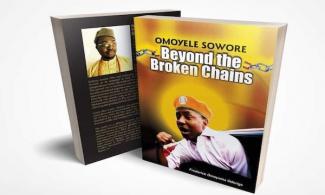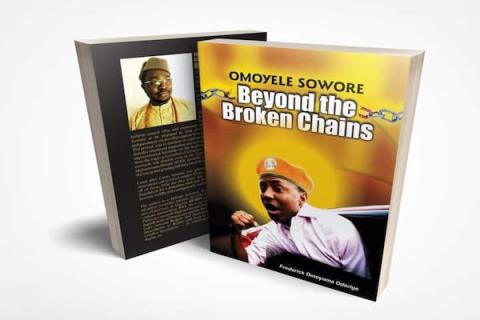
The book is an academic reference material for researchers because it is history, politics, statistics, philosophy, and literature rolled in one. It is a panacea against bad governance and a fear killer, for anyone who dares to hope.
A Nigerian activist based in Hungary, Fredrick Omoyoma Odorige is set to launch his book written in honour of the golden anniversary of human rights activist, Omoyele Sowore.
According to Odorige, the book titled 'Beyond The Broken Chains', was written in recognition of the fact that every genuine activist is a genuine patriot.

“The book has 356 pages, 92 chapters with about 40 coloured pictures. It is a revolutionary compendium that objectively chronicles all the events that took place from that wistful night of 3rd August 2019 when men from the State Security Service, ominously decked in black and armed with IWI Tavor-21 bullpup assault rifles, stormed and whisked away the pro-democracy activist, journalist and former presidential aspirant,” the author said.
“I recorded every court session and included several essays and concrete recommendations for a country where about 5,000 persons in government hold sway over 206 million and leading them through the dangerous path of gross abuse of human rights and social deprivation.
“The Broken Chains is woven around Sowore`s restricted movement of 553 days from Justice Ojukwu to Chief Magistrate Bello. It documents, from RevolutionNow, to EndSARS, how peaceful protesters were arrested and dehumanised by the same security officers that are equally suffering. The book shows the unjustified freezing of bank accounts, institutionalised impunity, disobedience to court orders, invasion of the court, payment of ransom in the name of bail conditions while terrorists are being pampered; immunity for those who became governors when they had ongoing corruption cases; the loud silence of he that was elected to lead from the front; the marches, the solidarity of relentless supporters and die-hard comrades; till the day Sowore identified the police officer that tortured him and broke his nose. It is a literary analysis with several essays laced with the bare facts of history and the motion of politics in a pseudo-democracy. It is deeply researched, unearthing and audacious.
“It is a publication of what the Nigerian media seem to be too afraid to report. The book is an academic reference material for researchers because it is history, politics, statistics, philosophy, and literature rolled in one. It is a panacea against bad governance and a fear killer, for anyone who dares to hope.

“It is to encourage Nigerian activists that they are not alone. You know, it is always to the detriment of the people when their activists are not supported and celebrated. Our problems remain today because people like Fela Anikulapo Kuti, Tai Solarin, Gani Fawehinmi, and others fought for us while we watched from a distance. This 'e nor concern me' attitude must no longer be allowed to continue.
“In a period where History is no longer taught in our schools, it is important for us to have comprehensive documentation of human rights abuses, and how activists like Sowore passed through thick and thin in a selfless effort towards birthing a new Nigeria. It is not enough that we praise the efforts of Bobi Wine of Uganda and we embarrass and disrespect our own through the agents of the government. If you observe very well on the social media, the government, through the office of the Special Adviser on Social Media and the Ministry of Information, allegedly have some persons they hire to comment negatively against activists on social media.
“They use fake profiles in such a way that one person could register 10 fake accounts. If you do not understand their game, you might believe that Sowore is hated by the people. Those hired hands are sufferers who were paid to fight their co-sufferers.
“Now that the government attacks, arrests, and detains journalists and peaceful protesters, they inadvertently encourage Nigerians in the diaspora to speak and write more. The more they take away the freedom and dignity of our compatriots back home, the more we shall react from the diaspora. Nobody owns Nigeria more than Nigerians.
“The virtual launching will take place on 14 March 2021 by 4 pm Nigerian time. All inquiries about the book should be sent to: [email protected].”
For over three decades, Sowore has consistently lamented the ineptitude of government institutions and overly corrupt politicians in Nigeria.
In 1989, Sowore took part in student demonstration, protesting against the conditions of an International Monetary Fund (IMF) loan of $120 million to be used for a Nigerian oil pipeline. Included among the conditions of the IMF loan, was a reduction in the number of universities in Nigeria from 28 to 5.
As the students’ union president of the University of Lagos between 1992 and 1994, he led a series of protests and demonstrations against the then-military government. His agitations for a better Nigeria and utter hatred for looters of Nigeria’s wealth have seen him arrested, detained, and in many cases, brutalised.
He was also deeply involved in the demand for a democratic government taking over from military rule on June 12, 1993.
Acknowledging Sowore's stride in the June 12 struggle in his memoir, a journalist, Niyi Babade, quoted the activist as saying, “Unannounced they came out of an unmarked grey vehicle and saw the ugly scenes then opened fire on all of us.
"I spent some quality time in my resting place (in the) the gutter till I heard the singing voices of the students of the University of Lagos led by Yele Sowore heading to (Moshood) Abiola’s house. I crawled out of my hiding and tried to get an exclusive shot when the hoodlums among the students attacked me and wanted to confiscate my camera but with the heroic effort of Sowore I was spared and allowed to join them as one of the hoodlums and a journalist which then gave me unlimited access to exclusive footage of the day till we got to Moshood Kashimawo Olawale (MKO) Abiola’s house."
After being expelled twice for political reasons and because of his student activism, Sowore graduated in 1994, got his final results in May 1995. He had his National Youth Service Corps programme in Yola, Adamawa State, from 1995-1996 but was never given a discharge certificate to date.
“It was purely political. The first time I was expelled was because of my participation in the Babangida Must Go/anti-SAP (Structural Adjustment Programme) protests that grounded Nigeria. The second time was after the military authorities targeted the student leadership by empowering and employing the services of cult gangs on campuses against us. It was at the height of the June 12 protests against the regime of General Sani Abacha,” he said in an interview in 2016.
The activist fled Nigeria and went to the United States in 1999 for urgent medical treatment of his vital organs.
Upon relocating to the US, Sowore continued with his activism by starting Sahara Reporters, a citizen journalism platform that continues to expose corruption.
Sowore was arrested by men of the Department of State Services, a domestic intelligence agency with a history of repression on 3 August 2019 ahead of a planned nationwide #RevolutionNow protest.
He was moved to the agency's headquarters in Abuja where he was illegally detained for 144 days despite different court orders issued for his release.
The DSS accused him of baseless crimes like money laundering and that he was plotting to overthrow President Muhammadu Buhari even though it failed to produce any evidence to substantiate its claim.
His detention was declared as arbitrary and illegal under international law by the United Nations Working Group on arbitrary detention, under the United Nations Commission on Human Rights (UNCHR).
The UN group lambasted the Nigerian government and asked it to stop the unlawful prosecution of the activist for his attempts to organise a peaceful protest in August of 2019.
It pointed out that the charges against him were quite vaguely defined and that such vagueness seems to have been used to make an ordinary exercise of freedom sound like a threat to national security and a terrorist act.